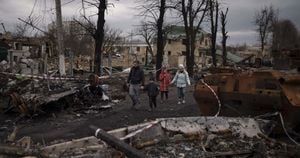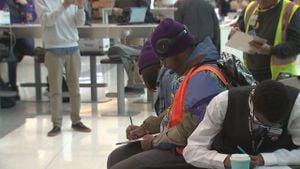Billionaires have started to back the formation of a new university aimed at promoting conservative values, primarily due to discontent over recent campus protests across the U.S. These protests, particularly those expressing pro-Palestinian sentiments, have resulted in significant changes to college environments and student experiences.
One of the key players funding this new venture is Wall Street trader Jeff Yass, who, alongside several other wealthy supporters, has pledged approximately $200 million to the University of Austin, Texas (UATX). This university is distinguishing itself as "anti-woke" and aims to attract students who feel alienated by the current liberal tendencies of traditional institutions. The university currently houses just 92 students, but its founders hope to expand its enrollment significantly.
Yass has contributed $35 million to the cause, viewing the new institution as necessary for fostering ideological diversity, which he believes has been stifled by the current higher education climate. He argues, "Higher education needs competition" and asserts philanthropists should establish new educational institutions aligned with traditional American values.
Another prominent donor, real estate mogul Harlan Crow, also supports UATX, claiming many believe current higher education is tending to reject the accomplishments of Western civilization as a whole. He notes, "Much of higher ed today seems to want to reject Western accomplishments and the accomplishments of Western civilizations.” Crow has hosted events for the burgeoning university and provided space for its summer program called “Forbidden Courses.”
The foundation of UATX is closely linked to growing frustrations over campus protests, particularly those associated with anti-Israel sentiments. Many high-profile donors reportedly contemplated withdrawing support from their alma maters due to their handling of these protests, which often featured anti-Semitic rhetoric influencing their university connections.
Pro-Palestinian protests surged at several universities, with student groups like Columbia University's Apartheid Divest declaring, “We are Westerners fighting for the total eradication of Western civilization,” reflecting the extreme sentiments circulating on campuses. These public demonstrations, which have included calls for the university to divest from companies associated with Israel, have garnered mixed reactions and significant media attention.
Columbia University's recent fundraising activities have suffered as well, with the school’s "Giving Day" seeing about $21.3 million raised—a drop of nearly 30% from previous years. This decrease follows intense scrutiny and backlash surrounding recent protests on campus, which included students vocally promoting anti-Zionist messages.
The interim president of Columbia, Katrina Armstrong, publicly apologized to protestors earlier this year after administrative responses to demonstrations led to the involvement of law enforcement. "I’m really sorry. I understand this is tricky, but I just want everyone to know I recognize the hurt caused by our actions,” she stated. This atmosphere of heightened tension has left many students feeling unsettled.
For students like Emmit DeHart, the shift has been dramatic. He initially attended the University of Washington but transferred to Yeshiva University due to feelings of alienation and discomfort stemming from rampant anti-Semitism he encountered. On campus, he stumbled upon protests featuring slogans like “Free Palestine” and was personally targeted with accusations of complicity. “It felt really uncomfortable and unsafe walking to class every single day,” DeHart explained, highlighting the personal toll such campus unrest can take.
His experience is echoed by many students nationwide. Following the deadly Hamas attack on Israel, anti-Semitic incidents on campuses reportedly surged by 500%, with students feeling increasingly threatened during their daily academic lives. The Anti-Defamation League's record reflects this increase, drawing attention to the complex and often volatile relationship between students advocating for Palestinian rights and those supporting Israel.
Students symbolizing the divide have not backed down; for example, Marie Adele Grosso, involved with pro-Palestinian activism at Barnard College, has repeatedly faced administrative pushback and penalties for her protests. Grosso was one of over 50 students suspended for participation in protests, illustrating the serious repercussions students are facing for their activism.
A backlash against the protests has led to university administrations cracking down on protest activities. Many institutions, seeking to restore order, have revised their codes of conduct to tighten prohibitions on demonstrations—in some cases banning them altogether during certain hours or limiting locations where protests can occur. For example, Barnard College introduced new policies requiring students to notify administration 36 hours prior to any protest mid-semester, cutting down on spontaneous activism.
Efforts to manage dissent on campuses have sometimes led to backlash from students who feel their rights to protest and express their opinions are under siege. Events have sometimes turned violent or resulted in serious clashes with law enforcement, reminiscent of the protests from previous decades. This case of repression has prompted many students to rally against perceived censorship, with groups like Columbia University Apartheid Divest vehemently opposing what they see as administrative overreach.
While the narrative of campus protests is becoming chronicled, it raises questions of safety and freedom for students, particularly those from marginalized backgrounds facing rebuke for their beliefs. The emergence of universities like UATX signifies a shift not merely on financial commitments to education, but on the ideological front, attempting to redefine what campuses stand for amid tumultuous times.
The future remains unclear as universities grapple with the fallout from these protests. Will these burgeoning movements lead to permanent changes to college policies—ones fundamentally altering how students express dissent? Or will they be temporary disruptions, losing steam as new classes arrive? Only time will tell as students navigate their academic journeys amid heightened tensions over free expression, ideological leanings, and personal safety.



